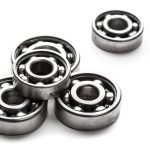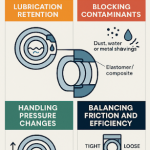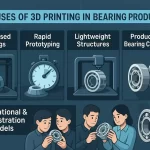Carbon steel is one of the most common types of steel used in manufacturing today, and bearings are among the specific tools which can take great advantage of it. While there are a variety of different carbon steel alloys, MCS or medium carbon steel works relatively better in industrial settings while offering a host of advantages compared to other materials. It has a higher tolerance to extreme heat and can withstand heavy loads in a wide range of applications. They are used in everything from automobiles, trains, or aeroplanes to construction equipment. In bearings, they also offer a set of unique benefits supporting mission-critical applications. Medium carbon steel is a versatile steel that is used in bearings to offer greater performance within the machinery. This makes bearings strong and durable which is ideal for use in a variety of industrial and engineering applications.
What is Carbon Steel and What are its Types?
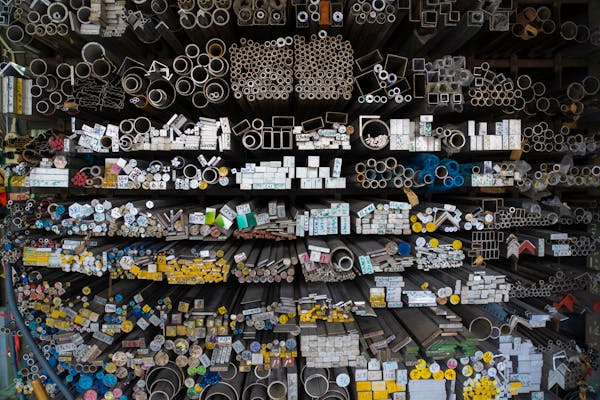
Carbon steel is an alloy composed primarily of iron and carbon with a number of other elements. The main role of carbon in steel is to increase its yield strength, tensile strength, and hardness. Due to their excellent mechanical properties, we find carbon steel is used in almost every industrial and home application in some shape or form. There are three types of carbon steel used in bearings:
- High-carbon steel is the strongest and most durable option, making it ideal for heavy-duty applications. As the name suggests, the percentage of carbon in this type of steel is the highest – over 0.6%.
- Low-carbon steel is softer and easier to work with, making it a good choice for less demanding applications. With less than 0.30% carbon, this steel comes with minimal carbon content.
- Medium-carbon steel strikes a balance between the two, offering good strength and durability while being easier to work with than high-carbon steel. This specific alloy uses anywhere from 0.30% to 0.60% of carbon as one of its integral materials.
Medium-Carbon Steel Bearing: Salient Features
Medium carbon steel bearings offer numerous benefits in applications where greater stability and endurance are required. Here’s a look at some of the significant ones.
Higher Fracture Toughness:
Carbon steel is highly resistant to fracture, which means it can handle long operating cycles of bearings without any problems. Its resistance to fatigue also provides significant durability.
Greater Crack Propagation Resistance
Unlike lower grades of steel, medium carbon steel is more robust against cracking due to stress. This allows offering bearings a longer service life and reduces the need for frequent maintenance.
Highly Resistant to Wear And Tear
These medium-carbon steel bearings are highly resistant to wear and tear, meaning they can withstand a lot of wear and tear over time in high-performance applications.
Resistance to Corrosion
Medium-carbon steel bearings are also resistant to corrosion, meaning they won’t rust or corrode over time.
Self-Lubricant
Another great feature of medium-carbon steel bearings is that they are self-lubricating. This means that they don’t require any external lubrication, making them very easy to maintain. Additionally, self-lubricating bearings also tend to have a much longer lifespan than other types of bearings.
Impact Resistance
Medium-carbon steel bearings are also very resistant to impact. This means that they can withstand high loads and shocks without damage. This makes them ideal for use in applications where there is a lot of vibration or impact.
Greater Performance in a Contaminated Environment
Due to its ability to resist corrosion, medium carbon steel is suitable for use cases where they are installed in contaminated environments without any performance issues, such as oil fields and refineries.
Mechanical Properties of Medium Carbon Steel
- Tensile Strength: The tensile strength of medium carbon steel varies from 500 – 850 MPa.
- Hardness: Medium carbon steel’s hardness is around 200 MPa (Brinell Scale).
- Ductility: Medium carbon steel has moderate ductility.
- Impact Resistance: Medium carbon steel has moderate impact resistance.
Physical Properties of Medium Carbon Steel
Medium carbon steel’s balanced strength, hardness, and toughness make it a popular material for engineering and industrial applications. The physical properties listed below make medium carbon steel appropriate for use in machinery, automotive, and structural applications.
- Density: The density of medium carbon steel is between 7.75–7.89 grams per cubic centimetre.
- Thermal Conductivity: Medium carbon steel’s thermal conductivity is around 346–360 BTU-in/hr-ft2-°F.
- Electrical Conductivity: The electrical conductivity of medium carbon steel is lower than low carbon steel. (6–10 MS/m)
Heat Treatment of Medium Carbon Steel
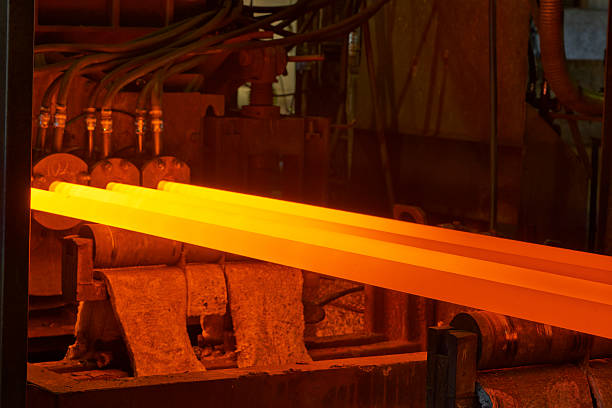
Heat treatment methods are used to improve mechanical properties like hardness, strength, and ductility. There are various heat treatment processes used for medium carbon steel, some of the common ones are listed below:
- Annealing: This heat treatment method is used to soften the steel and increase its grain strength and ductility.
- Quenching: Quenching is used to improve the mechanical properties of the steel. Like increases hardness and strength while maintaining some level of toughness.
- Tempering: Tempering involves decreasing the hardness of the steel while increasing its ductility and impact resistance.
Applications of Medium Carbon Steel
Because it strikes a balance between strength, toughness, and ductility, medium carbon steel is a popular steel choice for a variety of industries. Medium carbon steel is frequently used in the following industries:
- Automotive: The Automotive industry requires/uses the most medium carbon steel. It is used in the production of vehicle parts like axles, gears, shafts, and other components. The reason behind such wide usage can be attributed to the steel’s good strength and wear resistance.
- Construction & Infrastructure: Medium carbon steel is also used in the construction industry, specifically in the construction of beams, columns, and bridge components.
- Manufacturing: Medium carbon steel is widely used in the manufacturing & machinery industry due to its mechanical properties. It is used in various machine components like pumps, motors, gearboxes, hydraulic cylinders, etc.
Conclusion
All these benefits listed in this blog make Medium-Carbon Steel a popular choice for manufacturers who want high-performance bearings that are also cost-efficient. In terms of applications, medium-carbon steel is widely used across transmission bearings and pinion support bearings
FAQ's
What are the four types of carbon steel?
The four types of carbon steel are low-carbon, medium-carbon, high-carbon, and ultra-high-carbon steel.
What is medium-carbon steel?
Medium carbon steel is steel with a good balance of strength and ductility.
Is 1018 steel a medium carbon steel?
No, 1018 steel is a low-carbon steel.
Is medium carbon steel stronger than stainless steel?
Yes, medium carbon steel is stronger than most stainless steel, however, some stainless steel is stronger than medium carbon steel.
What are the 5 types of carbon?
5 types of carbon are diamond, graphite, amorphous carbon, fullerenes, and carbon nanotubes.



